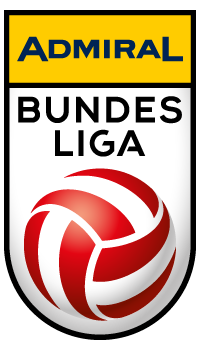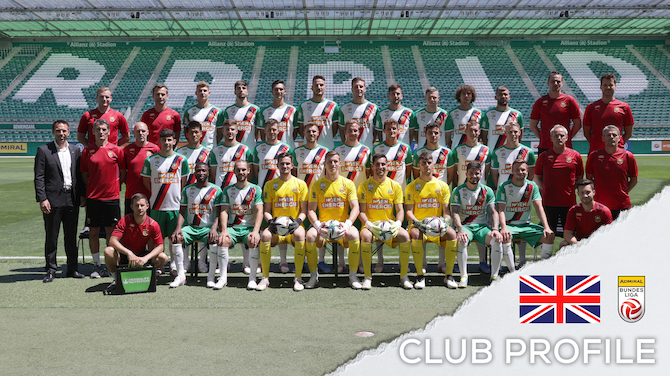Founded: 1899
Home ground: Allianz Stadion
Location: Hütteldorf, Vienna
Colours: Green/White
Manager: Dietmar (“Didi”) Kühbauer
Website: www.skrapid.at
The history:
Rapid Vienna are one of the most tradition-steeped clubs in Austria and they are by some distance the most popular too, with one in every three football fans recently admitting to the league’s yearly survey that the Hütteldorfers are their Austrian team of choice. The Green & Whites boast an astonishing 32 top-flight championship titles, though they are currently without major silverware of any kind since 2008.
The first national champions
The club’s roots can be traced back to the summer of 1897, when 1. Wiener Arbeiter Fuβball Club was founded. But that name was changed to SK Rapid two years later – in part because anything associated with the workers’ movement was regarded with suspicion by the authorities at the time – as were the club colours in 1906. Rapid initially played in red and blue before changing to their trademark green and white strip – though the club now incorporates its former colours into its away kits as a tribute to those early years.
An Austrian national championship was formed for the first time in 1911. It was consistently dominated by Viennese clubs – in fact, it was not until 1965 that it was first won by a team from outside the capital – and in particular by the Green & Whites, who won both of the first two titles and seven of the first 10. They did so under the stewardship of legendary club manager and coach Dionys Schönecker, who steered the club away from financial crisis and homelessness, and into a period of sustained success.
Beyond Austria’s borders
Shortly after Schönecker gave up his coaching role in 1925, Rapid began to take part in the newly launched Mitropa Cup – a competition that served as a forerunner to the European Cup and was contested by the best clubs from Central Europe and Italy. Despite losing the first two finals to Sparta Prague and Ferencváros respectively, Rapid became the first Austrian club to win the prestigious tournament in 1930 courtesy of a 4-3 aggregate victory over Sparta in the final.
With the Nazis ascending to power across the border, Austria was soon annexed and its football clubs were incorporated into German competitions. Rapid proved they were a match for any club in their neighbouring country, however: the Green & Whites first beat FSV Frankfurt 3-1 in the Tschammer-Pokal – the predecessor to the modern-day DFB-Pokal – in 1938 and then famously came from three goals down to beat heavy favourites Schalke 4-3 in the final of the Greater German Championship in 1941. They are the only club from outside Germany’s borders to have ever been crowned its national football champions.
Legendary players
The scorer of a 10-minute hat-trick in the aforementioned victory over Schalke, Franz Binder was one of the greatest strikers of all time with over 1,000 career goals. After hanging up his boots as a player, he went on to coach the club across three different spells and managed other legendary Rapidler such as Ernst Happel – after whom the Austrian national stadium is named – and Gerhard Hanappi, who would later design Rapid’s ‘Weststadion’. The Green & Whites moved into the new arena in 1977 and it was named after Hanappi following his premature death from cancer in 1980.
Other legends to ply their trade for Rapid include the star of the early years, Josef Uridil; Hans Krankl, who scored 336 competitive goals in 449 games for the club and was later voted its ‘Player of the Century’; and Antonin Panenka, the inventor of the eponymous penalty kick and the first Czech player to move to a western league. Michael Konsel, Heribert Weber, Andreas Herzog, Peter Schöttel and Dietmar Kühbauer were also club icons and fan favourites that were selected in the Rapid Vienna ‘Team of the Century’.
The Bundesliga era
Rapid have managed seven league titles since the inception of the Bundesliga, competing with their cross-city foes Austria most of the time. The two clubs have had a heated rivalry over the years in what is the most-played city derby in continental Europe, but Rapid have the better record from their 332 previous meetings with 136 wins, 77 draws and 119 defeats (figures accurate prior to 2021/22 season).
In more recent times, it has mostly been Red Bull Salzburg that have blocked Rapid’s path to domestic success. As Austrian football’s dominant force since the turn of the millennium, Salzburg have been largely responsible for the fact that the Green & Whites have not lifted a trophy since the 2007/08 Austrian Bundesliga title. Since then, they have finished second in the league seven times and lost two cup finals.
Cup Winners’ Cup near misses
In the latter years of the 20th century, Rapid twice reached the final of the now-defunct European Cup Winners’ Cup – but tasted defeat both times: the Green & Whites first fell at the final hurdle when they were beaten 3-1 by English side Everton in 1985, then succumbed to a 1-0 loss to Paris Saint-Germain of France in the final 11 years later.
The Hütteldorfers have since qualified for the group stages of the Champions League on two occasions – in 1996/97 and 2005/06 – taking on the likes of Manchester United, Juventus and Bayern Munich. They have not featured in Europe’s premier club competition since, but have participated in the Europa League twice in the last three years and are guaranteed another European group stage involvement in 2021/22.
The stadium:
With the old Gerhard-Hanappi-Stadion in Vienna’s 14th district showing signs of wear and tear, a decision was taken in the summer of 2014 to build a new stadium on the same site. Rapid played in the Ernst Happel Stadion during the two years it took to construct the new arena, which was named Allianz Stadion for sponsorship reasons and inaugurated with a pre-season friendly win over Chelsea on 16 July 2016.
The Allianz Stadion, which cost around €54 million in total to build, boasts a capacity of more than 28,000 for domestic matches, making it the third-largest club stadium in Austria behind Salzburg’s Red Bull Arena and Klagenfurt’s Wörthersee Stadion. That figure sinks to around 24,000 for international fixtures, however, in order to comply with UEFA’s requirements.
The stadium boasts one of the best matchday experiences in the Bundesliga, with a raucous pre-match atmosphere that is accentuated by a wide range of choreographies, tifos and banners from the ultras and hardcore fans in the west stand. The ‘Rapid-Viertelstunde’ is a sight to behold at the home games too. A tradition that dates back over a century to 1909, the Hütteldorf faithful will burst into applause as the match enters its final 15 minutes and give their team one last push – to turn the game around if they are losing, or to get over the finish line if they are winning.
The team:
Rapid are coached by their former captain Didi Kühbauer, who won a league and a cup with the capital club in the mid-1990s and was later voted into the ‘Team of the Century’. Having previously coached fellow Bundesliga clubs Admira Wacker, Wolfsberg and St. Pölten, he moved to the Hütteldorf club a couple of months into the 2018/19 season and is currently the Bundesliga’s longest-serving coach at a single club.
Kühbauer has steered the club to back-to-back second-place finishes but this season he will have to do without Rapid’s emerging young star Yusuf Demir, whose mazy dribbling runs and brilliant left-footed finishes set the league alight last season and earned him a season-long loan move to Barcelona this summer. That transfer could soon become permanent too, with the player having already surpassed expectations and impressed at first-team level in Catalonia.
But Rapid still have some exceptionally talented players in their ranks such as defender Leo Greiml, midfielder Christoph Knasmüllner and forward Taxi Fountas – and have brought in some reinforcements too, recruiting left winger Jonas Auer from Mlada Boleslav in the Czech league and signing the trio of Robert Ljubicic, Kevin Wimmer and Marco Grüll on free transfers.
Vocabulary
|
tradition-steeped |
traditionsreich |
|
trophy drought |
Titel-Durststrecke |
|
workers’ movement |
Arbeiterbewegung |
|
under the stewardship |
unter der Leitung |
|
forerunner |
Vorgänger |
|
eponymous |
gleichnamig |
|
inception |
Anfang |
|
foe |
Feind |
|
tale of woe |
Leidensgeschichte |
|
defunct |
erloschen |
|
wear and tear |
Abnutzung |
|
inaugurate |
einweihen |
|
raucous |
lärmend |
|
accentuate |
hervorheben |
|
longest-serving |
dienstälteste |
Die Kollegen von "The Other Bundesliga" porträtieren in regelmäßigen Abständen die Klubs der Liga - auf Englisch mit der dazugehörigen Vokabelauswahl. In dieser Serie sind bisher folgende Klubporträts entstanden: SK Austria Klagenfurt, SK Sturm Graz, LASK, FK Austria Wien, RZ Pellets WAC, FC Red Bull Salzburg, WSG Tirol SV Guntamatic Ried, FC Flyeralarm Admira, TSV Egger Glas Hartberg

























